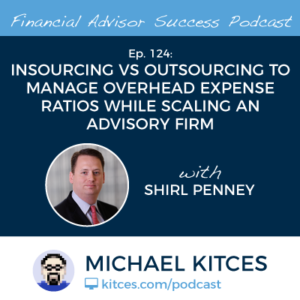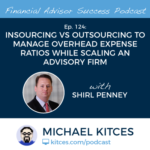 Welcome back to the 124th episode of Financial Advisor Success Podcast!
Welcome back to the 124th episode of Financial Advisor Success Podcast!
My guest on today's podcast is Shirl Penney. Shirl is the co-founder and CEO of Dynasty Financial Partners, a back and middle-office service provider for large independent RIAs that has more than $32 billion on their platform across 47 advisory firms that they support.
What's unique about Shirl, though, is the way that Dynasty has focused itself purely to be a highly scaled service provider for RIAs while allowing the firm's services to remain completely independent and without any requirement to buy in or tuck in or exchange equity for participation, and the particular focus they've taken on providing all that necessary infrastructure and support for large wirehouse breakaway teams and sizable RIAs with hundreds of millions or more in assets under management.
In this episode, we talk in depth about the Dynasty model. The four key service lines it offers, including transition support and consulting for breakaway brokers, its broad investment platform, including an in-house TAMP as well as a wide range of third-party SMA, UMA, and alternative investment solutions, its core business of mid-office support services for advisory firms, covering everything from compliance to marketing to technology, and its new Dynasty Capital Strategies line that does direct lending to advisory firms for everything from financing acquisitions, succession plan financing, to offering what they call revenue anticipation notes to allow advisory firm owners to partially monetize the equity of their firms to generate additional capital to reinvest for more growth and acquisitions, and still giving the firms a chance to buy their revenue back if they decide they want to in the future.
We also talk about the cost of outsourcing an advisory firm's core operations and middle office. The Dynasty model of charging an average of about 15% of revenue to provide its back and middle-office services, the typical gross margins that firms that leverage Dynasty's core services have and how they compare to the overhead expense ratios and gross margins of typical advisory firms, and why it's so challenging for advisory firms to maintain their margins as they grow on that path to $1 billion of AUM and beyond because the need for specialized and dedicated roles tends to emerge before the firm can really fully afford to hire full-time employees for each.
And be certain to listen to the end, where Shirl talks about his own perspective on the broader trends in the industry. Why he's so upbeat on the RIA model, the key lessons he's learned in how to build and scale a business from zero to 70 employees in 10 years, and how Shirl maintained his own focus and perseverance when it took more than 2 and a half years before he was able to take his own first paycheck out of the business for his family.









 Welcome back to the 123rd episode of Financial Advisor Success Podcast!
Welcome back to the 123rd episode of Financial Advisor Success Podcast!
